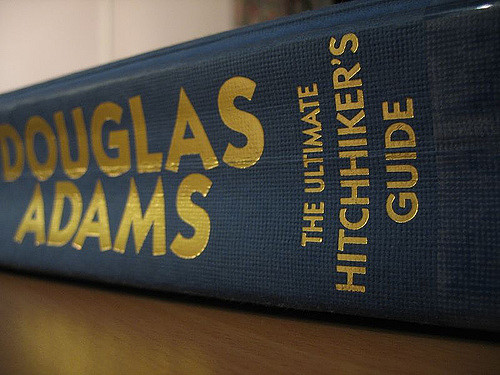Why Hitchhiker’s Guide?
Summer reading selected to entertain, provoke
October 5, 2016
Why was “The Hitchhiker’s Guide to the Galaxy” by Douglas Adams this year’s selection for school-wide summer reading? From the novel’s incorporation of satirical comedy to address of societal issues, English teachers believe Hitchhiker’s has much to offer.
According to English teacher Emily Philbin, appeal to a wide audience is the main consideration that goes into deciding the summer reading book.
“Each year we try to come up with a bunch of titles and then discuss finding something maybe a little different that would appeal to a different group of students,” Philbin said.
“This one was chosen because we thought it was a creative choice, different from previous choices, [and] appealing to some students who maybe wouldn’t have liked previous choices,” English teacher Deborah Saltzman said.
“We thought that maybe it was time to bring some comedy to the summer reading,” English teacher Seth Czarnecki said, referencing previous years’ choices such as “The Book Thief,”
“Unwind,” and “Never Fall Down,” all of which involved more serious issues.
Aside from its comedic element, many teachers agree that this book offers a variety of facets through which to interpret it.
“There’s so many levels of the book,” English teacher Jennifer Zuba said. “You can look at it on a basic level of ‘Oh, this is fun and satire’ or you can dig really deep and say ‘These are the questions of the universe: Why are we here? How did we get here? So you can look at it more philosophically or a little light-heartedly.”
“[Adams] stated some of his ideas about civilization and human institutions, so underneath the wackiness is a serious message, really a number of messages, that I thought made for some good conversations,” Saltzman said.
Despite being a goofy story, the teachers liked how it brought attention to the possibility of extraterrestrial life and other thought-provoking themes.
“[The book delves into] how little and insignificant we are as a entity in the universe,” Principal Tom Mead said. “So I think, as a consequence of reading this book, I’ve been aware of the ongoing discoveries being made about possible places where life can be in the universe.”
Although the novel got mixed reviews from students, Philbin believes in the importance of being able to articulate why it was liked or disliked.
“You can learn a lot about yourself and your ability to discuss something even though it’s not your favorite book,” Philbin said.
According to Philbin, book recommendations are much appreciated and welcomed for the future.
“I would love if students maybe want to suggest a few titles for the future,” Philbin said. “We get a lot of complaints, but we don’t get a lot of help.”









